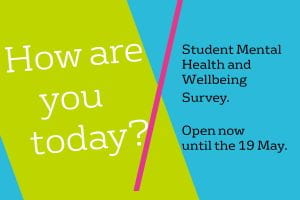 Today is University Mental Health Day, a campaign jointly run by Student Minds and the University Mental Health Advisors Network.
Today is University Mental Health Day, a campaign jointly run by Student Minds and the University Mental Health Advisors Network.
Looking after our community’s mental health is, of course, a year-round commitment. So why – you may ask – is Thursday 3 March important?
It’s an opportunity to bring our University community together around an issue that affects us all, and to join a nationwide conversation with other institutions. We want to help ensure no colleague or student feels alone with their mental health.
Change, transition and wellbeing
For students, going to university has always been a time of change. Many are leaving home for the first time to experience a new city, new friends and a new way of life. Although this can be very exciting and enjoyable, many students face difficulties during the transition to their new life – the last couple of years more than ever.
It’s also been a challenging time for our nearly 7,500 members of staff. I’ve previously talked about how I found feeling isolated and dealing with the problems created by the pandemic difficult, and I know from talking with colleagues how many of you have found the past couple of years especially hard.
The COVID-19 pandemic has put greater pressure on us all but has particularly affected students whose experience of higher education has been far removed from what they imagined. Universities have an important role in looking after the wellbeing of their students. We aim to build a culture of proactively managing wellbeing through self-help, peer support, education around drugs and alcohol, sexual consent, and safety on campus, as well as programmes like B:Active Healthy minds.
Our Student Wellbeing Service offers help and guidance to anyone experiencing challenges, or just wanting some extra support. Our Wellbeing Access team can triage and respond to students, directing them to appropriate services. We’ve kept waiting times for counselling low, and staff have trained in specialist areas, including support for those affected by sexual violence.
More students tell us about problems affecting their mental health before they arrive, and we have increased resources for our disability and mental health advisors to provide additional support. Finally, more than 90% of our students now ‘opt in’ to allow us to contact someone if we are concerned about them.
The Zero Suicide Alliance
This is not something that any institution can do alone. We work closely with our partners in the city to support our thousands of young people, often arriving in Bristol for the first time – from GPs and other NHS services to local organisations like Nilaari and Bristol Drugs Project.
One of the charities we have recently partnered with is the Zero Suicide Alliance (ZSA), hosted by Mersey Care NHS Foundation Trust. It works with organisations across the UK to raise awareness of suicide and its contributing factors and aims to help break the stigma that still surrounds suicide.
We are encouraging all students and staff to take an online suicide awareness course developed by ZSA in partnership with the NHS. The course has been designed to help us have potentially life-changing conversations with our friends, our colleagues and our wider community.
The training will help you spot any warning signs, give advice on how to have a conversation with someone you’re worried about, and tell you where to go to get further support.
If you do take the training, please look after yourself during the session. It’s designed to take 20 minutes, but we recommend allowing longer, so you can pause for breaks and take time to reflect. Try to do it alongside someone else if you can – either virtually or in person.
I’ve done the training myself, and I was reminded how important it is to notice how those around us are; that it’s okay to ask questions if we’re concerned about someone, because although that may feel difficult to do, it can really help; and finally, that it’s really helpful to signpost where support is available.
And please remember – today, tomorrow and every day: it’s okay to ask for help whenever you need it. Along with our wellbeing support for students, there is a variety of services available for staff too – including face-to-face counselling and online resources, which you can find on the wellbeing pages of our website.
Thank you for reading this blog post – by looking out for each other we can make the University a safer place for everyone.
Take the training: There is a specific training course for students, which can be accessed via the ZSA website. For colleagues, you can find the general training in Develop – just log in and search ‘ZSA’ in the catalogue.
You can find our Student Mental Health and Wellbeing Strategy online.






